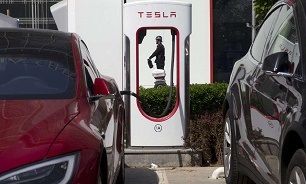Time for Beijing to postpone EV quotas
Beijing intends to enact a quota system in 2018 to goad automakers to drastically expand electric vehicle production. To date, very few automakers -- foreign or domestic -- are ready to adopt the system.
 khodrocar- The China Association of Automobile Manufacturers disclosed last week that the program likely will take effect this month. That creates a scary scenario for the Chinese auto industry.
khodrocar- The China Association of Automobile Manufacturers disclosed last week that the program likely will take effect this month. That creates a scary scenario for the Chinese auto industry.It is time for the government to move back the time frame for imposing the quotas to avoid derailing the domestic auto industry from the current stable growth track.
The EV production quotas first appeared in the California-style carbon trade program the Ministry of Industry and Information Technology, China’s auto industry regulator, floated in September 2016.
The program, which caught the auto industry off guard, has since triggered a huge backlash from automakers operating in China and industry trade groups in and outside the country.
Late last year, executives at Volkswagen Group and General Motors, the two largest automakers in China, complained to the press that they need more time to adapt to the program’s requirements.
On June 13, the government published a revised version of the program, but the quotas were unchanged.
A few days later, industry trade groups from the United States, Europe, Japan and Korea jointly sent a letter to China’s Ministry of Industry and Information Technology. They urged the ministry to postpone enforcement of the program for at least a year and soften penalties for noncompliance.
According to the program, automakers that fail to earn required carbon credits must purchase credits from other automakers. Otherwise, they would have licenses to produce and import traditional vehicles suspended by the government.
And last week, the China Association of Automobile Manufacturers disclosed on its website that it has made a similar plea to ministry officials.
Why have VW, GM and all the major industry bodies made similar appeals to the Chinese government?
The EV production targets the government has set under the carbon credit program are well beyond the reach of the vast majority of automakers.
After the revision, the program still requires automakers to earn eight carbon credits for every 100 vehicles they produce annually in 2018. The required carbon credits for the same level of output will rise to 10 in 2019 and 12 in 2020.
Under the program, a plug-in hybrid qualifies for two carbon credits. EVs are allotted to two to five carbon credits depending on their ranges -- the longer the range, the more carbon credits an EV can earn.
In 2016, VW and GM each produced nearly 4 million vehicles in China. Assuming their annual production remains the same, they each would be required to earn 320,000 carbon credits in 2018.
To obtain the required credits, they must each churn out next year either 160,000 plug-in hybrids or from 80,000 to 160,000 EVs, depending on the range of the EVs.
That’s a mission impossible for the two global auto giants. GM launched sales of its first EV, a Baojun-badged microsedan with a range of 155 km last month, while VW won’t sell its first EV, the eGolf, until next year.
In fact, except for Tesla, no other global automaker could possibly produce as many plug-in hybrids or EVs as stipulated by the program by 2018.
What about the dozens of domestic automakers in China? Well, among them, only two -- BYD Co. and Jianghuai Automobile Co. -- can meet the EV quotas next year, according to the manufacturers association’s assessment.
China’s auto industry is healthy as car shoppers continue to migrate from inexpensive microvans to crossovers, SUVs and luxury-brand vehicles.
Light-vehicle deliveries in the country rose 4.3 percent year on year to 1.68 million units in July, as the market continues to recover from a reduction in tax incentives on small vehicles in January.
The EV output quotas under China’s carbon credit program have little backing in reality. If rushed through, it would disrupt the product portfolios of most automakers operating in China, foreign automakers and trade groups noted in a joint letter.
The Chinese government should heed the warning and reschedule the program.
source: auto news china
Latest News


